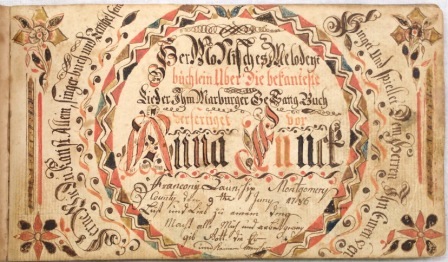New acquisition: Anna Funk tunebook
Written by Forrest Moyer on January 4, 2017

For several years, the MHC has featured an “Artifact of the Week” on our Facebook page, and a selection of recent acquisitions on our Library & Collections webpage. In 2017, we’ll combine those features into a monthly highlight here on the blog, where we will share the story of an interesting artifact or collection recently donated to the MHC.
This month we’re featuring a 1786 manuscript tunebook with not one, but TWO beautiful fraktur bookplates and a poetic inscription by the owner of the book, Anna Funk of Franconia Township, Montgomery County.
One book, two bookplates
When the donor brought this piece into the MHC this past August, we were surprised and excited to see it. Fraktur experts were not aware of it previously, as far as we know.
The manuscript tunebook was a common format. Students in Mennonite parochial schools received them from teachers, filled with hymn tune notation, in order to learn singing in school. Often the book contained a decorative fraktur bookplate in front with a statement naming the owner, place and date, and sometimes an inspirational verse. It is likely parents paid the teacher to make and decorate the book as a gift to their child.
The bookplate pictured above is attached to Anna Funk’s tunebook and dated 1786. We attribute it to schoolmaster Andreas Kolb, who was a prolific fraktur artist with a distinctive style. He also penned the tunes in the book.
What surprised us most is that a second bookplate was pinned into the book! It is also for Anna Funk in the Franconia School, but dated 1783, three years earlier. The plate is colorful and imaginative, with a broad-winged angel motif across the top. The artist has not been identified.

Bookplate dated 1783, by an unknown artist.
Why did Anna need a second tunebook in 1786 if she already had one? Both were for use with the Marburg Gesangbuch. Perhaps the 1783 tunebook had become damaged? Or the quality of the first book was not satisfactory to Anna or her family? We don’t know. But it’s interesting and a testament to the significance of fraktur in the lives of colonial children, that Anna preserved the plate from the earlier book.
“The paper is my field…”
The serious young woman didn’t stop there. Anna made an inscription of her own, two years later, the neatness of which suggests she was an able and diligent scholar. A personalized poem on the value of penmanship, it is written on the page preceding Andreas Kolb’s bookplate:
Anna Funkin bin Ich genand, In Himmel ist mein Vatterland,
In Montgomery Caunti bin ich gebohren, Zu eurem schüler ausercohren;
Daß babier ist mein Acker, Daß macht mich klug und Wacker
Die feder ist mein Pflug, Daß macht mich weiß und Klug
Die dinde ist mein sahmen; Damit schreib ich mein Namen.
Anna Funckin den 24ten February, Anno 1788.
Anna Funk I am named, Heaven is my Fatherland,
In Montgomery County I am born, as your scholar [or disciple?] I am chosen.
The paper is my field; it makes me prudent and brave.
The feather is my plow; it makes me wise and prudent.
The ink is my seed; with it I write my name.
Anna Funck the 24th of February. in the year 1788.

Inscription by Anna Funk, dated 1788.
Her mysterious identity
When an artifact is donated to the MHC, we try to identify the original owner. With fraktur, information on the piece itself (name, date, location) often allows for the owner to be identified through research.
In this case, however, it is difficult to say who Anna Funk may have been. No candidate of the right age appears in Funk family records.
Only one family of this name lived in Franconia in the 1780s–Christian & Barbara Funk, whose children were already grown. Anna may have been a granddaughter who lived with them. Christian was a controversial Mennonite bishop who was excommunicated during the “Funkite” schism of the Revolutionary War period. The girl who owned this book, whatever her family relationship to Christian, would have known the experience of this painful division in the Mennonite community.
In the late 20th century, the book was found in the desk of T. Everett Kirk of Dresher, Montgomery County (the donor’s father), though he was not descended from the Funk family. It remains a mystery how he came to own it, and who exactly Anna Funk was.
You can view the catalog record for the tunebook here and the 1783 bookplate here.
Gift of Mary Ann Kirk Saurman and daughter Deborah Geissel.

The tunebook’s blue-grey paperboard cover.
